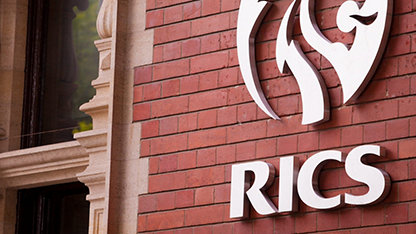RICS has no staff members in Ukraine but we do have a number of professionals. Lionheart is working to provide any support they can to those members.
"RICS is deeply concerned by the attack on Ukraine and the terrible consequences for the Ukrainian people. Our thoughts are with them at this time, and we hope that there is an end to the invasion soon.
We strongly support all the steps being taken by the international community against the Russian state, institutions and individuals and are supporting our members to implement the sanctions imposed. We are also offering any support we can to our members in Ukraine, and Lionheart is providing financial and emotional support to those members and their families.
We have very carefully considered whether we should take action against members and firms based in Russia. We are not currently accepting any payments from or providing any services to those members and firms. However, our rules do not allow us to suspend or remove members or firms without evidence of wrongdoing by the individual or firm, and we believe it would be unethical to do so. We know that many Russians do not support the actions of their government.
We would of course take action against any member or firm who is failing to comply with sanctions or who is helping others to evade them. Our members and firms have an obligation under our Rules of Conduct to speak up and report such misconduct if they suspect it."
- Richard Collins, Interim CEO
In light of the sanctions being imposed by governments in response to these events, we would remind our members and firms of the important role they play in ensuring that sanctions are complied with.
The requirements in the global professional statement “Countering bribery, corruption, money laundering and terrorist financing” include the need to check if a potential customer or client (or their ultimate beneficial owner) is under any relevant sanctions that would prohibit you from establishing a business relationship with them.
Given the developing crisis firms should review their anti-money laundering policies in light of the increased risks. In particular we would strongly suggest that firms and members adopt an extremely careful approach to due diligence checks.
Members and firms must check the sanctions list for their jurisdiction – for example see the UK sanctions list – before offering services or undertaking transactions for clients. Where concerns arise firms should follow any requirements in their jurisdiction for reporting suspicious activity.
Complying with sanctions is both a legal and ethical obligation, and there can be serious consequences for failures to do so.
RICS firms and members must also comply with the Rules of Conduct including Rule 1 requiring them to act with integrity and Rule 5 requiring them to act in the public interest and maintain public confidence in the profession. Members and firms should consider the risk to their reputation, the reputation of the profession and the public interest in deciding whether to accept instructions from specific clients.
Latest update 7th April 2022
Many charities (including Lionheart) are providing support to Ukrainian refugees and have launched emergency appeals for donations. Supporting these is a practical step that many of us have already taken where we can and will continue to take. RICS is also using its network to support Ukrainian members of RICS who are looking for work. At the moment we are handling requests for help in finding work in the Netherlands, Germany and Bulgaria. If any members or firms can support with providing opportunities for work please contact our AEMEA membership support team who are coordinating these efforts (aemea@rics.org).
We know that some members have been asking whether there are practical steps they can take, when the time comes, to support reconstruction work in Ukraine. Members might want to donate and support NGOs that provide support to countries and the UN in undertaking this work for example:
- Humanitarian training and support for NGOs and aid workers worldwide - RedR
- MapAction – The humanitarian mapping charity
RICS will also use its contacts within UN agencies and the EU to offer help and link members with appropriate expertise and post conflict/disaster training to relevant bodies when that expertise is needed in Ukraine. However it is important that this work is led by Ukraine itself, the surveyors in that country and appropriate international agencies which RICS will support wherever it can.
Ukraine Crisis – Q&A Guidance
Our records indicate that RICS has over 100 members based in Russia. We will continue to monitor the emerging sanctions to consider whether any affect the standing of any of our individual members. All RICS members follow and are bound by the same ethical standards worldwide.
We will continue to monitor the list of those on whom sanctions have been imposed. If any sanctions apply to members of RICS we would take appropriate action.
Any action taken by RICS would be on the basis of evidence of wrongdoing by the individual or legal sanction against them. Our Royal Charter does not allow us to take action against members based solely on their nationality or where they are based globally, and we do not believe it would be ethical to do so.
The global professional statement “Countering bribery, corruption, money laundering and terrorist financing” sets requirements and provides best practice advice on taking a risk-based approach to client due diligence, beneficial ownership and politically exposed persons. This guidance supports our members and firms in their obligations under the Rules of Conduct not to facilitate money laundering or the avoidance of international sanctions.
Clearly given the developing crisis and sanctions being imposed on individuals and institutions, firms should review their anti-money laundering policies in light of the increased risks, and members should keep themselves informed of those changes. In particular we would strongly suggest that firms adopt an extremely cautious approach to due diligence checks. Members and firms must check the sanctions list for their jurisdiction – for example see the UK sanctions list – before offering services or undertaking transactions for clients. Where concerns arise about a transaction firms should follow any requirements in their jurisdiction for reporting suspicious activity, and seeking clearance to continue where appropriate.
RICS firms and members must also comply with the Rules of Conduct including Rule 1 requiring them to act with integrity and Rule 5 requiring them to act in the public interest and maintain public confidence in the profession. Members and firms should consider risk to their reputation, the reputation of the profession and public interest in deciding whether to accept instructions to act for any specific client.
RICS has published an article providing this advice to members.
Our valuation team is working with valuation stakeholders to consider the effect of sanctions on markets and may publish further information in circumstances where valuation processes need to change. RICS members should continue to follow Global Red Book standards, including VPGA 10. Whether material uncertainty exists remains the decision of the RICS regulated member. They should include a sound rationale to explain the decision-making process and this should be recorded for future reference. Where material uncertainty is declared, the valuer is reminded that this should be explicitly stated.
RICS firms and members must also comply with the Rules of Conduct including Rule 1 requiring them to act with integrity and Rule 5 requiring them to act in the public interest and maintain public confidence in the profession. Members and firms should consider risk to their reputation, the reputation of the profession and public interest in deciding whether to accept instructions to act for any specific client.










